独家整理-初中易混单词辨析
初中英语易混淆的词语辨析
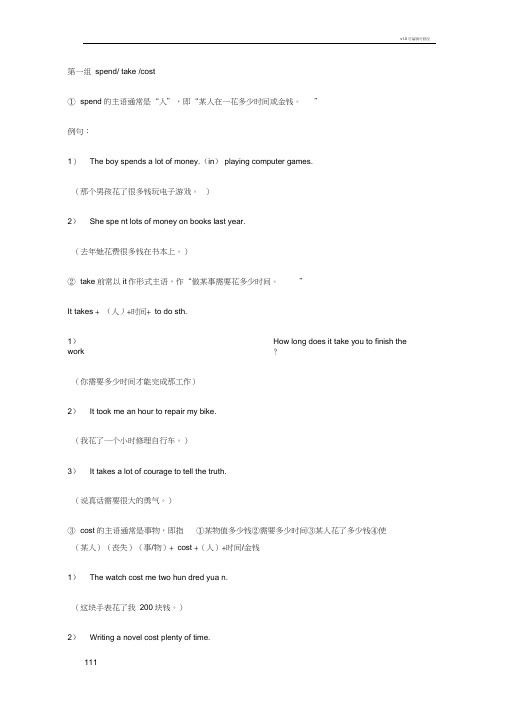
第一组spend/ take /cost①spend的主语通常是“人”,即“某人在一花多少时间或金钱。
”例句:1)The boy spends a lot of money.(in) playing computer games.(那个男孩花了很多钱玩电子游戏。
)2)She spe nt lots of money on books last year.(去年她花费很多钱在书本上。
)②take前常以it作形式主语,作“做某事需要花多少时间。
”It takes + (人)+时间+ to do sth.1)How long does it take you to finish the work ?(你需要多少时间才能完成那工作)2)It took me an hour to repair my bike.(我花了一个小时修理自行车。
)3)It takes a lot of courage to tell the truth.(说真话需要很大的勇气。
)③cost的主语通常是事物,即指①某物值多少钱②需要多少时间③某人花了多少钱④使(某人)(丧失)(事/物)+ cost +(人)+时间/金钱1)The watch cost me two hun dred yua n.(这块手表花了我200块钱。
)2)Writing a novel cost plenty of time.(写本小说要花很多时间。
)v1.0可编辑可修改3)The girl's bad behavior cost her pare nts many sleepless ni ghts.(那个女孩的不良行为使得她的父母许多夜晚睡不着。
)注意:cost的过去式,过去分词都是cost o第二组:speak/say/tell/talk①speak说某种语言,说某人好、坏话是及物动词;发表讲话,对某人说话,是不及物动词。
1)The stude nts speak En glish very flue ntly.(这些学生英语说得非常流利。
初中英语最容易混淆的单词、词组归纳总结,都是干货记得收藏
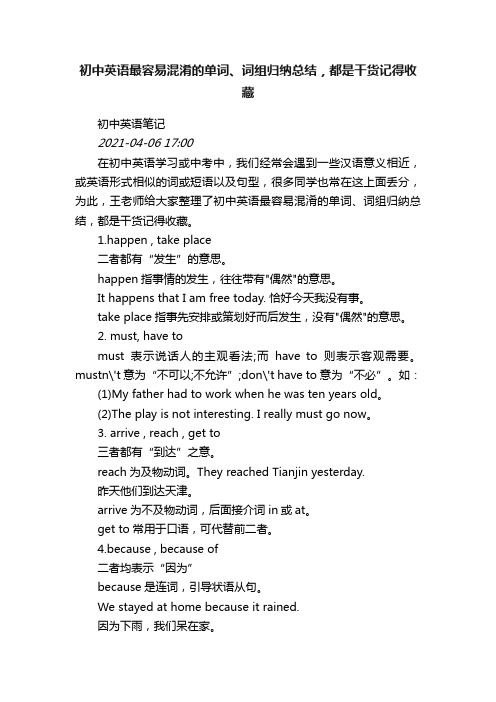
初中英语最容易混淆的单词、词组归纳总结,都是干货记得收藏初中英语笔记2021-04-06 17:00在初中英语学习或中考中,我们经常会遇到一些汉语意义相近,或英语形式相似的词或短语以及句型,很多同学也常在这上面丢分,为此,王老师给大家整理了初中英语最容易混淆的单词、词组归纳总结,都是干货记得收藏。
1.happen , take place二者都有“发生”的意思。
happen指事情的发生,往往带有"偶然"的意思。
It happens that I am free today. 恰好今天我没有事。
take place指事先安排或策划好而后发生,没有"偶然"的意思。
2. must, have tomust表示说话人的主观看法;而have to则表示客观需要。
mustn\'t意为“不可以;不允许”;don\'t have to意为“不必”。
如:(1)My father had to work when he was ten years old。
(2)The play is not interesting. I really must go now。
3. arrive , reach , get to三者都有“到达”之意。
reach为及物动词。
They reached Tianjin yesterday.昨天他们到达天津。
arrive为不及物动词,后面接介词in或at。
get to常用于口语,可代替前二者。
4.because , because of二者均表示“因为”because是连词,引导状语从句。
We stayed at home because it rained.因为下雨,我们呆在家。
because of是短语介词,后面接名词性词语。
We stayed at home because of the rain .因为下雨,我们呆在家。
5. in front of, in the front ofin front of…意思是"在……前面",指甲物在乙物之前,两者互不包括;其反义词是behind(在……的后面)。
初中英语核心词:易混词汇辨析

sad [sæd] a. (使人)悲伤的safe [seɪf] a.n. 安全的;保险柜safety [ˈseɪftɪ] n. 安全,保险There’s safety in numbers 人多势众sail[seɪl] n.v. 航行;航行;开航salad [ˈsæləd] n. 色拉(西餐中的一种凉拌菜);沙律sale [seɪl] n. 卖;出售salt [sɔːlt, sɔlt] n. 盐same [seɪm] n.a. 同样的事;同样的,同一的sand [sænd] n. 沙,沙子sandwich [ˈsænwɪdʒ] n. 三明治(夹心面包片)satisfy [ˈsætɪsfaɪ] n 满意,满足Saturday [ˈsætədɪ] n. 星期六save [seɪv] vt. 救,挽救,节省save one’s life 挽救某人的生命save one’s face 保全面子save the situation 挽回局势save one’s breath 保持沉默save time 节约时间save on 节约,节省We will save a lot of time if we go by car.我们要是乘汽车去可以节省很多时间。
say(said, said) [seɪ] vt. 说,讲go without saying 显而易见say to oneself 自言自语scarf[skɑːf] n. 领巾;围巾school [skuːl] n. 学校schoolbag['sku:lbæg] n. 书包science [ˈsaɪəns] n. 科学,自然科学scientist[ˈsaɪəntɪst] n. 科学家scissors [ˈsɪzəz] n. 剪刀score [skɔː(r)] n.&v. 得分;分数a score-keeper 记分员a score –sheet 记分单a score of 二十个screen [skriːn] n. 幕,荧光屏sea[siː] n. 海,海洋in the sea 在海里on the sea 在海滨by sea 乘船a sea of flames 一片火海search [sɜːtʃ] n.&v. 搜寻,搜查search for sb/sth 寻找某人/某物Rescue workers searched all night in the hope of finding more survivors.营救人员彻夜搜寻,希望找到更多的幸存者。
(完整版)中考英语易混词汇辨析
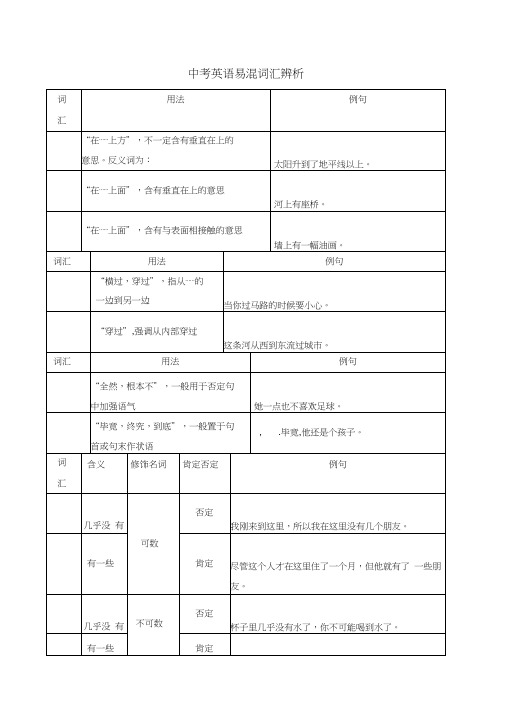
中考英语易混词汇辨析
一种状态的变化,后接形容词或名词他成为了一名医生。
词汇用法例句
表动作,指“去睡觉”
我经常很晚才去睡觉。
也表动作,指进入“睡着”状态
他发现很难入睡。
表动作,意为“刚刚入睡”,指“刚
睡着”的动作
.他刚睡着,这时有人大声敲门。
表状态,意为“睡着的”
这孩子睡着一个小时了。
词汇含义用法例句
发生常指具体事件的发生,特别指那些
偶然的或不能预见的“发生”
?
这事故是怎样发生的?
通常指“(某事)按计划进行或按计划
发生”,此外还有“举行”之意解放以后,发生了巨大变化。
例句
词汇用法
表示“曾经到过某处”,但目前人
不在那儿
? 你到哪儿去了?
表示“去了”,指人已经走了(至少
目前不在说话的地点,在去的途中
或已经到达目的地)
她不在这儿。
她去南京了。
表示“去了某地,并曾在那儿(一段
时间),或现在仍在那儿”她在上海待了几个周了。
词汇用法一言辨义“听到”,强调听的结果,不一定是有意识
的
“听”,强调听的动作,当然未必能听到什
么。
是不及物动词,接宾语时要加
我们仔细地听了半天,但什么也没听到。
词汇用法例句。
初级中学易混词汇资料辨析
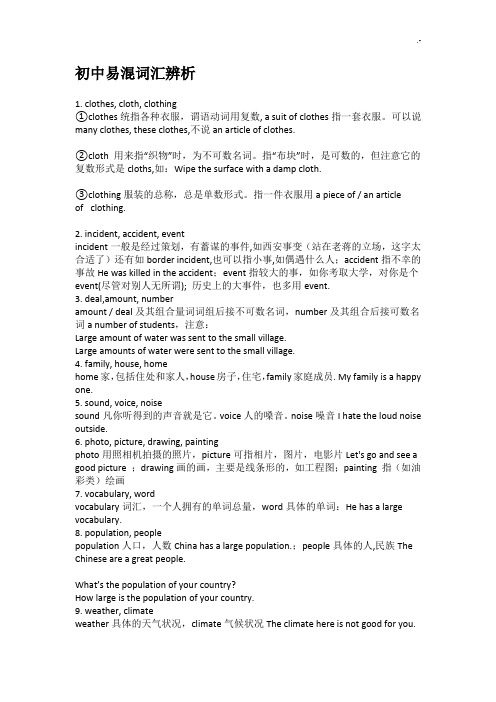
初中易混词汇辨析1. clothes, cloth, clothing①clothes统指各种衣服,谓语动词用复数, a suit of clothes指一套衣服。
可以说many clothes, these clothes,不说an article of clothes.②cloth 用来指“织物”时,为不可数名词。
指“布块”时,是可数的,但注意它的复数形式是cloths,如:Wipe the surface with a damp cloth.③clothing服装的总称,总是单数形式。
指一件衣服用a piece of / an articleof clothing.2. incident, accident, eventincident一般是经过策划,有蓄谋的事件,如西安事变(站在老蒋的立场,这字太合适了)还有如border incident,也可以指小事,如偶遇什么人;accident指不幸的事故He was killed in the accident;event指较大的事,如你考取大学,对你是个event(尽管对别人无所谓); 历史上的大事件,也多用event.3. deal,amount, numberamount / deal及其组合量词词组后接不可数名词,number及其组合后接可数名词a number of students,注意:Large amount of water was sent to the small village.Large amounts of water were sent to the small village.4. family, house, homehome家,包括住处和家人,house房子,住宅,family家庭成员. My family is a happy one.5. sound, voice, noisesound凡你听得到的声音就是它。
易混易错词语辨析
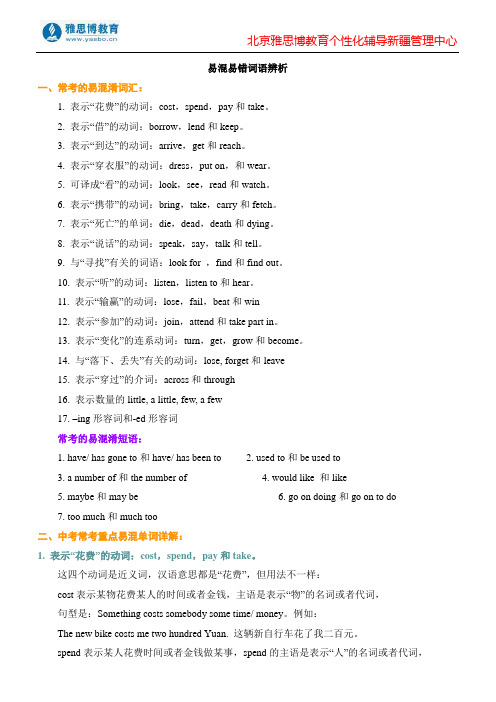
易混易错词语辨析一、常考的易混淆词汇:1. 表示―花费‖的动词:cost,spend,pay和take。
2. 表示―借‖的动词:borrow,lend和keep。
3. 表示―到达‖的动词:arrive,get和reach。
4. 表示―穿衣服‖的动词:dress,put on,和wear。
5. 可译成―看‖的动词:look,see,read和watch。
6. 表示―携带‖的动词:bring,take,carry和fetch。
7. 表示―死亡‖的单词:die,dead,death和dying。
8. 表示―说话‖的动词:speak,say,talk和tell。
9. 与―寻找‖有关的词语:look for ,find和find out。
10. 表示―听‖的动词:listen,listen to和hear。
11. 表示―输赢‖的动词:lose,fail,beat和win12. 表示―参加‖的动词:join,attend和take part in。
13. 表示―变化‖的连系动词:turn,get,grow和become。
14. 与―落下、丢失‖有关的动词:lose, forget和leave15. 表示―穿过‖的介词:across和through16. 表示数量的little, a little, few, a few17. –ing形容词和-ed形容词常考的易混淆短语:1. have/ has gone to和have/ has been to2. used to和be used to3. a number of和the number of4. would like 和like5. maybe和may be6. go on doing和go on to do7. too much和much too二、中考常考重点易混单词详解:1. 表示“花费”的动词:cost,spend,pay和take。
这四个动词是近义词,汉语意思都是―花费‖,但用法不一样:cost表示某物花费某人的时间或者金钱,主语是表示―物‖的名词或者代词,句型是:Something costs somebody some time/ money。
初中常见易混词语辨析汇总(学霸笔记)
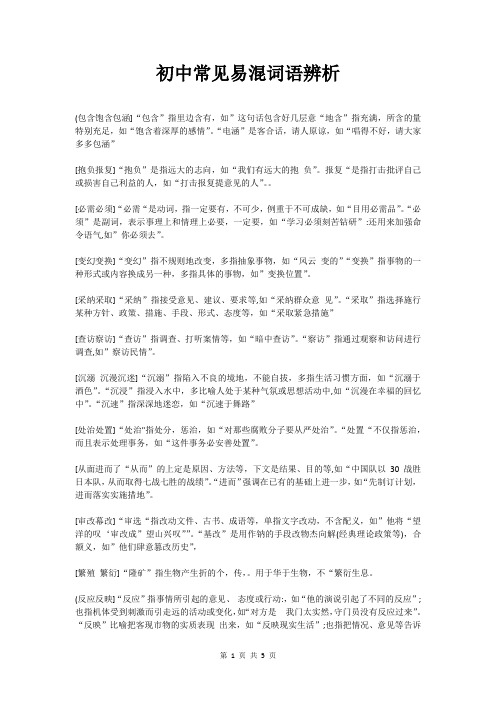
初中常见易混词语辨析(包含饱含包涵]“包含”指里边含有,如”这句话包含好几层意“地含”指充满,所含的量特别充足,如“饱含着深厚的感情”。
“电涵”是客合话,请人原谅,如“唱得不好,请大家多多包涵”[抱负报复]“抱负”是指远大的志向,如“我们有远大的抱负”。
报复“是指打击批评自己或损害自己利益的人,如“打击报复提意见的人”。
[必需必须]“必需“是动词,指一定要有,不可少,例重于不可成缺,如“目用必需品”。
“必须”是副词,表示事理上和情理上必要,一定要,如“学习必须刻苦钻研”:还用来加强命令语气,如”你必须去”。
[变幻变换]“变幻”指不规则地改变,多指抽象事物,如“风云变的”“变换”指事物的一种形式或内容换成另一种,多指具体的事物,如”变换位置”。
[采纳采取]“采纳”指接受意见、建议、要求等,如“采纳群众意见”。
“采取”指选择施行某种方针、政策、措施、手段、形式、态度等,如“采取紧急措施”[查访察访]“查访”指调查、打听案情等,如“暗中查访”。
“察访”指通过观察和访问进行调查,如”察访民情”。
[沉溺沉漫沉迷]“沉溺”指陷入不良的境地,不能自拔,多指生活习惯方面,如“沉溺于酒色”。
“沉浸”指浸入水中,多比喻人处于某种气氛或思想活动中,如“沉漫在幸福的回忆中”。
“沉速”指深深地迷恋,如“沉速于舞路”[处治处置]“处治"指处分,惩治,如“对那些腐败分子要从严处治”。
“处置“不仅指惩治,而且表示处理事务,如“这件事务必安善处置”。
[从面进而了“从而”的上定是原因、方法等,下文是结果、目的等,如“中国队以30战胜日本队,从而取得七战七胜的战绩”。
“进而”强调在已有的基础上进一步,如“先制订计划,进而落实实施措地”。
[审改幕改]“审选“指改动文件、古书、成语等,单指文字改动,不含配义,如”他将“望洋的叹‘审改成”望山兴叹””。
“基改”是用作钠的手段改物杰向解(经典理论政策等),合额义,如”他们肆意篡改历史”,[繁殖繁衍]“隆矿”指生物产生折的个,传,。
(完整版)初中常见易混淆英语词汇

(完整版)初中常见易混淆英语词汇1.sound, voice, noisesound自然界各种各样的声音,voice人的嗓音,noise噪音I hate the loud noise outside.2. exercise, exercises, practiceexercise运动,锻炼(不可数),exercises练习(可数),practice(反复做的)练习take exercise 做运动3. work, job二者均指工作。
work不可数,job可数a good job,What interesting work it is!4. cook, cookercook厨师,cooker厨具He is a good cook.5. police, policemanpolice警察的总称,后接复数谓语动词,policeman 指某个具体的警察The police are questioning everyone in the house.6. problem, questionproblem常和困难联系,前面的动词常为think about, solve, raise,question常和疑问联系,多和ask, answer连用7. price, prizeprice价格,prize奖,奖品,奖金win the first prize The price is high/low.8. a number of, the number ofa number of许多,谓语动词用复数。
the number of…的数目,谓语动词用单数。
The number of students is increasing.9. in front of, in the front ofin front of范围外的前面,in the front of范围内的前面A boy sits in the front of the room.10. next year, the next yearnext year将来时间状语,the next year过去将来时间状语He said he would go abroad the next year.11. in bed, on the bedin bed卧在床上,on the bed在床上The book is on the bed. He is ill in bed.12. the people, a peoplethe people指人,a people指民族The Chinese is a peace-loving people.13. it, oneit同一物体,one同类不同一I lost my pen. I have to buy a new one.14. that, thisthat指代上文所提到的,this导出下文所要说的I was ill. That's why…15. none, nothing, no onenone强调有多少,nothing, no one强调有没有,nothing指物,no one指人--- How many…/How much…? --- None.16. anyone, any oneanyone指人,不能接of,any one指人/物均可,可接of, any one of you17. who, whatwho指姓名或关系,what指职业或地位What is your dad? He is a teacher.18. what, whichwhat的选择基础是无限制的,which在一定范围内进行选择Which do you prefer, bananas or apples?19. other, anotherother后接名词复数,another后接名词单数other students, another student20. many, much, a lot ofmany和可数名词连用,much和不可数名词连用,a lot of可数,不可数均可,但不用于否定句I haven't many books.21. much more…than, many more…thanmuch more…than后接形容词或不可数名词,many more…than后接可数名词many more people, much more water, much more beautiful22. no, notno=not a/any, no friend=not a/any friend, no water=not any water23. by oneself, for oneself, to oneselfby oneself单独的,独自的,for oneself为自己,to oneself供自己用的24. at all, after allat all根本,全然, after all到底,毕竟After all he is a child.25. tall, hightall常指人或动物,high常指物体He is tall.26. fast, quicklyfast侧重于指人或物体具有运动速度快的特点,quickly侧重指某事完成或发生的快run fast, answer the question quickly27. high, highlyhigh具体的高,highly抽象的高,高度的think highly of(高度赞扬)28. sleeping, asleep, sleepysleeping正在睡觉,asleep睡着,熟睡,只能做表语,sleepy困的,有睡意的a sleeping baby,The baby is asleep. I'm sleepy.29. real, truereal真的,真实的,指的是事实上存在而不是想象的,true真的,真正的,指的是事实和实际情况相符合real gold, a true story30. pleasant, pleased, pleasingpleasant常用作定语,pleased常用作表语,pleased主语常为人,a pleasant trip,be pleased with…对…感到满意/开心31. ill, sickill做表语,sick定语、表语均可a sick boy, He is sick/ill.32. good, wellgood形容词,well副词,但指身体状况是形容词He is well again.33. hard, hardlyhard努力,hardly几乎不work hard, I can hardly believe it.34. excited, excitingexcited使人兴奋的,exciting令人兴奋的I'm excited. The news is exciting.35. before long, long beforebefore long不久以后,long before很久以前36. happy, gladhappy高兴,幸福,定表均可,glad高兴,只能做表语a happy girl, I’m happy/ glad to see you.37. instead, instead ofinstead是副词,放在句首或句末,instead of是介词短语,放在句中He didn't see a film. Instead he watched TV. He watched TV instead of seeing a film.38. too much, much tootoo much 后接不可数名词,much too后接形容词much too heavy39. raise, riseraise及物动词,rise不及物动词The sun rises in the east. Raise your hand, please.40. bring, take, carry, fetchbring拿来,take带走,carry随身携带,fetch去回这一往返动作fetch a box of chalk41. spend, take, pay, costspend人做主语,花钱,花时间; s pend…on sth./(in) doing sth; take物做主语,花时间; It takes sb some time to do sth.; pay人做主语,花钱,pay for; cost物做主语,花钱;sth cost some money42. join, join in, take part injoin加入某个组织,并成为其中的一员;join in参加小型的活动, join sb. in;take part in 参加大型的活动He joined the army five years ago.43. learn, studylearn学习,侧重学习的结果,study学习,侧重学习的过程,研究study the problem44. want, hope, wishwant打算,想要,want to do, want sb. to do, hope希望(通常可以实现),hope to do/ hope that… wish希望(通常不能实现)wish (sb.) to do, wish sb/sth. + n. I wish you success.45. answer, replyanswer及物动词,reply不及物动词,后接to, reply to the letter46. leave, leave forleave离开,leave for前往He left Beijing for Shanghai.47. drop, falldrop及物\不及物均可,fall不及物动词Prices fell/dropped. He dropped his voice.48. win, lose, beatwin后接sth.,反义词为lose, beat后接sb. win the game, beat them49. live on, live bylive on以…为主食,live by靠…谋生live on fish/ live by fishing50. catch a cold, have a coldcatch a cold不能和表示"一段时间"的状语连用,而have a cold 可以She has had a cold for a week.51. change for, change intochange for调换成,change into变成Change the shirt for a bigger one. Water changes into ice.52. go for a doctor, go to a doctorgo for a doctor去请医生,go to a doctor去看病53. arrive, get, reacharrive不及物动词,后接in (大地点),at(小地点),get不及物动词后接to,reach及物动词arrive in Beijing, get to Beijing, reach Beijing54. agree with, agree to,agree with同意某人,agree to同意某事,agree with you, agree to the plan, agree to do sth55. receive, acceptreceive收到某一东西,但不一定接受,accept接受I received a gift, but I didn't accept it.56. wear, put on, dresswear和dress表状态,wear接衣服等,可用进行时,dress接人,be dressed in, put on表动作It's cold outside. Put on your warm clothes.57. listen, hearlisten强调动作,hear强调结果I listened, but I heard nothing.58. look, see, watchlook看的动作,see看的结果,watch强调所看物体的变化、移动和发展watch TV59. lie, laylie躺,位于(lay, lain),说谎(lied, lied),lay平放(laid, laid) lay the book60. turn, get, growturn表突变,后常接表颜色的词,get强调变的结果,grow强调过程,逐渐的变化turn yellow, get tired, grow big61. close, shut, turn offclose和shut当关解时可以通用,用于可开合的物体,turn off用于指有开关的物体Close/Shut the door. Turn off the TV.62. at, in (表地点)at小地点,in大地点arrive at a small village, arrive in Shanghai63. day after day, day by dayday after day日复一日(无变化);day by day一天天地(有变化)Trees grow taller day by day.64. after, in (表时间)after接时间点,in接时间段,用于将来时after 7:00, in five minutes65. between, amongbetween两者之间,三者或三者以上两两之间, among三者或三者以上之间Switzerland lies between France, Germany, Australia and Italy.66. through, acrossthrough穿越空间,across在…上穿过through the forest, across the desert67. above, on, overabove在上面,不接触,on在上面,接触,over在正上方fly over the hill68. until, not…untiluntil到…为止,not…until直到…才(常跟点动词连用)I waited until 3:00.He didn't come until 3:00.69. besides, exceptbesides除了…还(包括在内)except除了(不包括在内),70. because, because ofbecause连词,连接两句话,because of后接词或短语He didn't go to school because of his illness.71. for example, such asfor example一般只列举一个,such as列举多个例子I have been to a lot of American cities, such as New York, Atlanta and Chicago.72. All right. That's all right. That's right.All right好吧;That's all right.没关系;That's right. 那是对的---Sorry. --- That's all right.73. such…that, so…that当如此…以至于解时,such…that修饰名词,so…that修饰形容词或副词,但名词前面如果有many, much, little, few修饰用so…that,不用such thatso many people that… such a lovely boy=so lovely a boy74. Shall I…? Will you…?Shall I…? 征求对方意见或向对方请示,意为我能…吗? Will you…?请求或建议对方做某事,意为你愿意…吗? Will you help me? Yes, I will.。
关于初二英语易混词语辩析

关于初二英语易混词语辩析1. day , dateday 和 date 这两个单词都与“日子”有关。
day 表示“日子,天”时,通常是指“某一天”的意思,它还含有“节日,假日,生日”的意思。
例如:He works1 eight hours a day. 他一天工作 8 个小时。
They stayed in Beijing for three days. 他们在北京呆了 3 天。
day 还可以表示“天气”。
例如:What a fine day! 多好的天气啊!而 date 通常用来指“日期,时日,年代”等,它不仅包括一般的年、月中的“日期”,而且还可以指历史上的某一“年代”或“日期”。
例如:I don't know the date of the football match. 我不知道那场足球赛的具体日期。
Please put a date on the letter. 请在信上写明日期。
The date of her birth is November 18, 1989. 他出生于 1989 年 11 月 18 日。
2. real, truereal 和 true 均表示“真的”的意思,都用作形容词,但 real 指客观存在的、并非想像或仿照的“真的,真正的”,其副词形式为 really .例如:Is this real gold? 这是真金吗?This is a story of real life. 这是现实生活中的一个故事。
I really don't know what to do next. 我真地不知道下一步该怎么办。
true 意为“真的,真实的”,它表示的“真实的,确实的”是和客观事实相一致的,并非杜撰、捏造的;其副词形式为 truly2 .例如:What he said is true. 他说的是真的。
It is a true story. 这是一个真实的故事。
初中英语易混词辨析

初中英语易混词辨析-CAL-FENGHAI.-(YICAI)-Company One1中考易混淆的同义词总结1.say, speak, talk, tell这四个词都有“说”的意思,其用法差异主要在于各自强调的对象、内容不同。
(1)say的意思是“说”、“讲”、“说出”,是及物动词,强调“说”的内容。
不仅可指口头“说”,而且可指书面“说”。
eg: ① He said nothing to me. 他对我什么也没说。
② He said in his letter that he was getting on well with his life.他在信中说,他生活得很好。
固定搭配:say hello/good bye/sorry to sb. 向某人问候/告别/道歉say “ yes ” to sb . = agree with sb. 同意某人say “ no ” to sb. = disagree with sb. 不同意某人(2) speak表“说”、“讲”,它可以表示任何一种方式的“说话”。
它着重“说话”这一动作本身,而不强调所“说”的内容。
它通常为不及物动词,但它也可以作及物动词,后接the language、the truth、a word等,或接表示语言名称的名词。
eg: ①Please speak more slowly and clearly. 请说慢些和清楚些。
②Who is speaking 你是谁(打电话时用语)③Can you speak Japanese 你会讲日语吗固定搭配:speak to sb. 对某人说话speak highly of 称赞speak one’s mind 说心里话; 直言不讳(3) talk表示“交谈”、“谈话”,它指连贯地与人交谈,着重指说话的动作,而不强调说话的内容。
它一般用作不及物动词。
eg:①What are you talking about 你们在谈论什么②We are talking about the Chinese football match.我们在谈论中国足球比赛。
初中英语常见易混词汇辨析

初中英语常见易混词汇辨析在初中英语的学习中,同学们常常会遇到一些容易混淆的词汇,这些词汇在拼写、发音、词义或用法上有相似之处,给我们的理解和运用带来了一定的困难。
下面就为大家详细辨析一些常见的易混词汇。
一、“a”和“an”“a”和“an”都属于不定冠词,用于泛指一个人或事物。
“a”用于以辅音音素开头的单词前,“an”用于以元音音素开头的单词前。
需要注意的是,这里所说的“元音音素”和“辅音音素”指的是读音,而不是字母。
例如,“a book”(一本书),“an apple”(一个苹果)。
“hour”(小时)这个单词虽然以“h”开头,但“h”不发音,它的读音是以元音音素开头,所以应该说“an hour”。
二、“alone”和“lonely”“alone”表示“独自的,单独的”,侧重于指客观上的独自一人,没有同伴。
“lonely”则表示“孤独的,寂寞的”,侧重于指主观上感到孤独、寂寞,带有感情色彩。
例如,“He lives alone but he doesn't feel lonely”(他独自生活,但并不感到孤独。
)三、“bring”和“take”“bring”意为“带来,拿来”,指把某物从别处带到说话者所在的地方。
“take”意为“拿走,带走”,指把某物从说话者所在的地方带到别处。
例如,“Bring your book here”(把你的书带到这儿来。
)“Take this bag to your room”(把这个包拿到你的房间去。
)四、“in front of”和“in the front of”“in front of”表示“在……前面”,指在某个物体外部的前面。
“in the front of”也表示“在……前面”,但指在某个物体内部的前面。
例如,“There is a tree in front of the house”(房子前面有一棵树。
)“The driver is sitting in the front of the bus”(司机坐在公共汽车的前部。
中考20组必考英语易混词辨析

初中必考20组必考英语易混词辨析——易混词辨析——1、accomplish vs. achieveaccomplish (v.): 完成某项任务。
例子: She accomplished her homework. (她完成了作业。
)achieve (v.): 实现目标。
例子: He achieved his goal. (他实现了他的目标。
)2、advice vs. adviseadvice (n.): 建议。
例子: I need your advice. (我需要你的建议。
)advise (v.): 提供建议。
例子: I advise you to study. (我建议你学习。
)3、allow vs. permitallow (v.): 允许,通常口语化。
例子: My parents allow me to go out. (我的父母允许我出去。
)permit (v.): 允许,通常正式。
例子: The school permits it. (学校允许这样做。
)4、bored vs. boringbored (adj.): 感到无聊的。
例子: I feel bored in class. (我在课堂上感到无聊。
)boring (adj.): 令人无聊的。
例子: The movie was boring. (这部电影很无聊。
)5、careful vs. cautiouscareful (adj.): 小心的。
例子: Be careful with that glass. (小心那只玻璃杯。
)cautious(adj.): 小心翼翼的,避免风险。
例子: He is cautious with money. (他在处理钱时很小心。
)6、common vs. ordinarycommon (adj.): 普遍的。
例子: It is common to use phones. (使用手机是很常见的。
中考易混词汇辨析

中考易混词汇辨析1.few和little【辨析】few只能修饰复数可数名词,little 只能修饰不可数名词。
Few people can live well with little money.2.a few和a little【辨析】a few只能修饰复数可数名词,a little 只能修饰不可数名词。
I need a little time to do a few things.3.a lot和a lot of【辨析】a lot只用作副词,相当于very much;a lot of 则用作定语修饰名词。
You’ve given me a lot of help. Thanks a lot.4.able和capable【辨析】able常以be able to do sth. 的形式出现,表示“有能力做某事”。
capable常以be capable of doing sth. 的形式出现。
He is able to speak three foreign languages.I am sure he is capable of doing the job well.5.accept和receive【辨析】accept表示主观上接受某物,receive表示客观上收到某物。
Jane __accepted______ a gift from Jim, but she didn’t __receive______ it.6.across和through【辨析】across指从物体的表面经过;through指从物体的内部或空间穿过。
He swam across a river and walked through a forest before he got to the village.7.ago和before【辨析】ago只作副词,不能单独使用,必须与表示时间的词连用,用于从现在算起的某段时间之前,常与一般过去时连用。
初中英语总复习易混词盘点

初中英语总复习易混词盘点初中英语总复习易混词盘点从近年来的中考题可以看出命题者的目的都是要考查学生对一些较易混淆、形式上非常相近的词(词组)是否能掌握扎实,是否熟悉每个词组的中文意思并能在句子中熟练运用。
要想做对以上出现的类似的中考考题,考生必须能总结清各种初中阶段所学过的较易混淆、形式上非常相近的词(词组),熟记所有词组的中文意思,熟悉它们的用法和区别。
为了方便同学们复习,特将常考易混词(词组)整理如下:一、容易混淆的动词:[考试说明] 了解及物动词和不及物动词用法;掌握动词不定式作宾语、宾语补足语、状语以及疑问词连用构成不定式短语的基本用法;理解动词不定式作主语和定语的用法;初步掌握延续性动词和瞬间动词在用法上的区别等。
1. come & be here[误] He has come here for three hours.[正] He came here three hours ago.[正] He has been here for three hours.come是瞬间动词,不是延续性动词,在肯定句中不能与表示一段时间的状语连用。
而要与表示一段时间的状语连用,就要用延续动词。
与此同类的还有borrow/lend-keep; join-be in/at; die-be dead; buy-have; leave-be away,etc.2. cost & take & spend & pay[误] I cost a lot of time to read stories.[正] It cost me a lot of time to read stories.[正] I spent a lot of time reading stories.cost除了钱的花费以外,还能表示时间上的花费,但常用物做主语。
spend句子主语是人,可指花费时间和金钱,但后面的动词要用-ing形式,后面也可跟名词短语,介词用on。
关于初二英语易混词语辩析

关于初二英语易混词语辩析我们的初中生平常英语学习有没有积累一些错题历史总结,接下来,小编给大家准备了关于初二英语易混词语辩析,欢迎大家参考与借鉴。
关于初二英语易混词语辩析1. day , dateday 和date 这两个单词都与“日子”有关。
day 表示“日子,天”时,通常是指“某一天”的意思,它还含有“节日,假日,生日”的意思。
例如:He works1 eight hours a day. (他一天工作 8 个小时。
)They stayed in Beijing for three days. (他们在北京呆了 3 天。
) day 还可以表示“天气”。
例如:What a fine day! (多好的天气啊!)而 date 通常用来指“日期,时日,年代”等,它不仅包括一般的年、月中的“日期”,而且还可以指历史上的某一“年代”或“日期”。
例如:I don't know the date of the football match. (我不知道那场足球赛的具体日期。
)Please put a date on the letter. (请在信上写明日期。
)The date of her birth is November 18, 1989. (他出生于 1989 年 11 月 18 日。
)2. real, truereal 和 true 均表示“真的”的意思,都用作形容词,但 real 指客观存在的、并非想像或仿照的“真的,真正的”,其副词形式为really .例如:Is this real gold? (这是真金吗?)This is a story of real life. (这是现实生活中的一个故事。
)I really don't know what to do next. (我真地不知道下一步该怎么办。
)true 意为“真的,真实的”,它表示的“真实的,确实的”是和客观事实相一致的,并非杜撰、捏造的;其副词形式为 truly2 .例如:What he said is true. (他说的是真的。
- 1、下载文档前请自行甄别文档内容的完整性,平台不提供额外的编辑、内容补充、找答案等附加服务。
- 2、"仅部分预览"的文档,不可在线预览部分如存在完整性等问题,可反馈申请退款(可完整预览的文档不适用该条件!)。
- 3、如文档侵犯您的权益,请联系客服反馈,我们会尽快为您处理(人工客服工作时间:9:00-18:30)。
初中阶段易混单词辨析名词1.clothes, cloth, clothingclothes统指各种衣服,谓语动词永远是复数,cloth指布,为不可数名词clothing服装的总称,指一件衣服用a piece of2.amount, numberamount后接不可数名词,number后接可数名词a number of students3.family, house, homehome家,包括住处和家人,house房子,住宅,family家庭成员.4.sound, voice, noisesound自然界各种各样的声音,voice人的嗓音,noise噪音I hate the loud noise outside.5.photo, picture, drawingphoto用照相机拍摄的照片,picture可指相片,图片,电影片,drawing画的画Let's go and see a good picture.6.population, peoplepopulation人口,人数,people具体的人China has a large population.7.road, street, path, wayroad具体的公路,马路,street街道,path小路,小径,way道路,途径Show me the way to the museum.8.course, subjectcourse课程(可包括多门科目),subject科目(具体的学科)a summer course9.exercise, exercises, practiceexercise运动,锻炼(不可数),exercises练习(可数),practice(反复做的)Practice makes perfect.10.work, job二者均指工作。
work不可数,job可数a good job11.country, nation, state, landcountry侧重指版图,疆域,nation指人民,国民,民族,state侧重指政府,政体,land国土,国家The whole country was sad at the news.12.police, policemanpolice警察的总称,后接复数谓语动词,policeman指某个具体的警察The police are questioning everyone in the house.13.problem, questionproblem常和困难连系,前面的动词常为think about, solve, raise,question常和疑问连系,多和ask, answer连用14.trip, journey, travel, voyagetravel是最常用的,trip指短期的旅途,journey指稍长的旅途,voyage指海上航行a three-day trip短语1.instead, instead ofinstead是副词,放在句首或句末,instead of是介词短语,放在句中He didn't see a film. Instead he watched TV.2.too much, much tootoo much后接不可数名词,much too后接形容词much too heavy3.no more than, not more thanno more than相当于only,仅仅,只有,not more than至多,不超过4.a number of, the number ofa number of许多,谓语动词用复数。
the number of…的数目,谓语动词用单数。
The number of students is increasing.5.in front of, in the front ofin front of范围外的前面,in the front of范围内的前面In the front of the room sits a boy.6.for a moment, for the momentfor a moment片刻,一会儿,for the moment暂时,一时Thinking for a moment, he agreed.7.take air传播,走漏,take the air到户外去,散步We take the air every day.8.in a word, in wordsin a word总之,一句话,in words口头上In a word, you are right.9.in place of, in the place ofin place of代替,in the place of在…地方A new building is built in the place of the old one.10.in class, in the classin class在课上,in the class在班级里He is the best student in the class.代词和介词1.it, oneit同一物体,one同类不同一I lost my pen. I have to buy a new one.2.none, nothing, no onenone强调有多少,nothing, no one强调有没有,nothing指物,no one指人--- How many…/How much…? --- None.---Who is here?--No one.---What’s there?---Nothing .3.anyone, any oneanyone指人,不能接of,any one指人物均可,可接of any one of you4.other, anotherother后接名词复数,another后接名词单数other students, another student5.in,on,at,by表示时间1)in①世纪(century)、年份、季节、月份②泛指某天的早中晚in the morning2)on①星期、日期②具体某天的早、中、晚on the morning of April 20th,20133)at +具体的时间点I get up at 7 o’clock .4)by+时间点,表示在一段时间之后,与一般将来是连用I will finish it by 4 pm tomorrow.6.since和for表示时间,与现在完成时连用。
since与时间点连用,for与时间段连用。
I have been here for 2 years .I have been here since 2017.7.in front of与in tzhe front ofin front of 表示在物体外部的前面,而in the front of 表示在物体内部的前面。
The dog is in front of the car.The driver is in the front of the car.形容词和副词1.tall,hightall常指人或动物,high常指物体He is tall.2.fast, quicklyfast侧重于指人或物体具有运动速度快的特点,quickly侧重指某事完成或发生的快run fast, answer the question quickly3.high, highlyhigh具体的高,highly抽象的高,高度的think highly of5.sleeping, asleep, sleepysleeping正在睡觉,asleep睡着,熟睡,只能做表语,sleepy困的,有睡意的a sleeping baby ;The baby is asleep. I'm sleepy.6.most, mostlymost用于表感受的肯定句中,相当于very,当大部分,大多数解时是形容词或名词,mostly大部分,是副词most people, the people are mostly…7.real, truereal真的,真实的,指的是事实上存在而不是想象的,true真的,真正的,指的是事实和实际情况相符合real gold, a true story8.pleasant, pleased, pleasingpleasant常用作定语,pleased, pleasing常用作表语,pleased主语常为人,pleasing主语常为物9.close, closelyclose接近,靠近,closely紧紧地,紧密地closely connected, stand close10.ill, sickill做表语,sick定,表均可a sick boy11.good, wellgood形容词,well副词,但指身体状况是形容词He is well again.12.quiet, silent, stillquiet安静的,可以发出小的声音,silent不发出声音,但可以动,still完全不动,完全无声响He stand there still.他站在那儿,一动不动,也不说话。
13.hard, hardlyhard努力,hardly几乎不te, latelylate迟,晚,lately最近,近来I haven't seen him lately.15.living, alive, live, livelyliving, alive, live均为活着的,living定表均可,alive定表均可,定语后置,live只能做定语,lively意为活波的all the living people=all the people alive16.deep, deeply*deep具体的深*deeply抽象的深,深深地deeply moved, dig deep17.aloud, loud,loudly*aloud出声地,loud大声地,loudly指嘈杂声(闹钟,铃声)*read aloud(出声地读)动词1.agree with,agree to和agree on*agree with...指“同意某人或某人的意见、观点、决定、想法、安排、解释”等,其后可以是一个名词,也可以是what引起的从句。
如:I don’t agree with what you said.*agree to...是指“同意某计划、建议、或建议”等;后跟动词原形,意为“同意干某事”。
如:Who else will agree to this suggestion besides him?*agree on...指在某方面取得一致的看法或意见。
